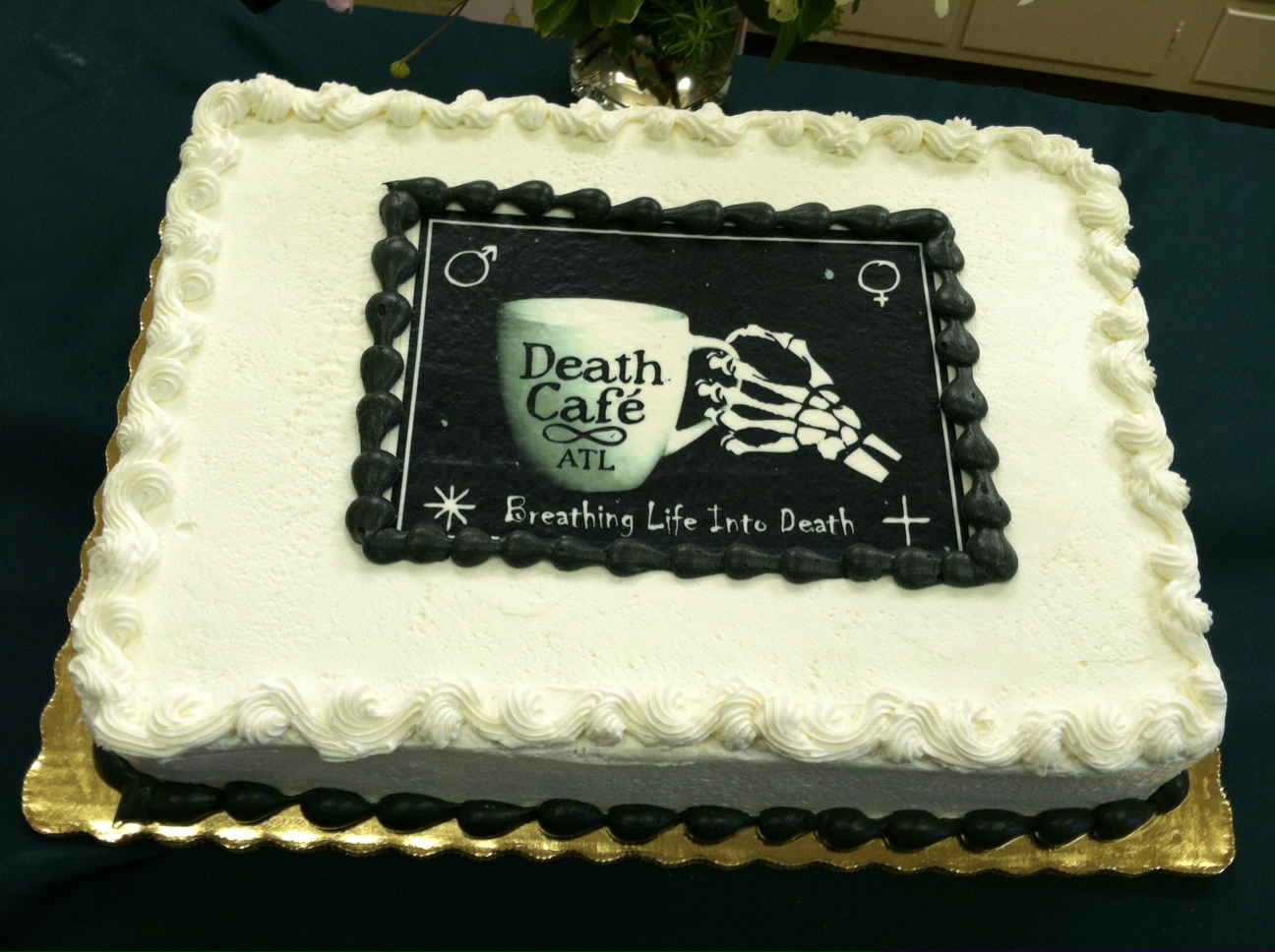Best of 2013 – Death Cafe Atlanta: A Coffee Klatch for Grim Matters

Kate Sweeney / WABE
This week, we’re looking back on some of our favorite stories from the past year.
All through 2013, Death Café Atlanta brought crowds to Historic Oakland Cemetery. The subject matter? All things grim. As WABE’s Kate Sweeney reported, the group’s popularity might signal a larger trend.
*
On a recent Saturday afternoon, the meeting room in the bell tower at Oakland Cemetery was filled to capacity, as people of all ages had conversations about topics related to death and dying.
Broadcast version of story that aired Friday, Sept. 20, 2013
Childhood recollections. Bad funerals. Superstitions. “Bucket” lists. Legal issues. Fears.
No grim subject is off-the-table at Death Café Atlanta’s free monthly meetings, which are open to the public, though attendance is limited. If this seems weird, think about how we usually approach end-of life issues.
Put simply, we don’t. Not until we’re forced to, say, when someone close to us dies. At least, that’s what you hear from most professionals dealing in death.
David Roach, the president and CEO of West Cobb Funeral Home, asks survivors a routine roster of more than 100 questions after someone dies.
He says many of these blind-side people, who simply don’t know their mother’s mother’s maiden name or their father’s veteran serial number. “I see this look that comes upon their faces, and they go, ‘I never had this conversation with my mother. I never had this conversation with my father. They didn’t want to discuss this.’”
But now that may be changing.
There are more than 200 Death Cafes around the world, according to Mark LaRocca-Pitts. The hospice chaplain and one-time coffeehouse manager says that when he first heard of Death Cafes, it was as if someone had invented an event that perfectly combined two of his very favorite things.
He held Atlanta’s first event in March 2013, and he says once you get people started talking at a Death Café, it’s hard to get them to stop.
The cake and coffee may help. One rule of Death Café is that there must be cake. This meeting’s arrives emblazoned with Death Café’s tongue-in-cheek logo: a skeleton hand grasping a coffee mug.
The goal is to create a fun and freewheeling atmosphere, so that it’s easier to talk about things like…well, like planning one’s own funeral.
Richard Cohen and Perry Mitchell, sitting at one of the intimate tables of four, have some definite opinions there.
“I’ve always said I do want to be at my funeral. The problem is, I can’t—but I already know what they’re gonna play. ‘The Thrill is Gone’ by BB King,” says Cohen.
Mitchell chimes in. “Yeah, Bob Dylan. I’m a total Bob Dylan freak.” Mitchell plans to create a complete song list for his final memorial, maybe even mix CDs to hand out to mourners.
Like most people who come to Death Cafes, both these men are baby-boomers: born between 1946 and 1964. So is Pam Woodley, who’s sitting with them.
“I do think that we’re all going through these issues with our parents,” she says. “And they were maybe the generation that does whatever the doctor tells you.”
But her generation—which makes up the largest age cohort both in the nation and in metro Atlanta—it’s not exactly known to sit back and accept the status quo.
They stood up for social change in the 1960s and ‘70s, and then went on to invent things like getting married on the beach and the modern home-birth. Now, as many experience the loss of their parents, they want to shape the ends of their own lives, too.
Perry Mitchell is adamant on this point. “If I’m controlling my life, I also want to control how I die. I do not want a feeding tube. I do not want a ventilator. I do not want my ribs cracked for CPR. I don’t want that. While I’m here, I want to live as good as I can, and when I can’t live that way anymore, I’m ready to go.”
Hospice care, which emphasizes comfort at life’s end, has surged in recent years. Georgia is up to just-under-200 hospice facilities. In 2008, there were just 75.
End-of-life plans require conversations about death, the sorts of dialogues encouraged at Death Café, whose own numbers are striking. Since it started in March 2013, Death Café Atlanta has reached its capacity numbers at every meeting. It could be an indicator that, with an aging boomer population, a once-taboo topic is not so off-limits anymore.
The day ends with a rendition of the song “Happy Trails.” Sheets with lyrics are passed around, and everyone croons along to a recording from the 1940s. People laugh as they imitate the high parts in falsetto. It’s a bit of lightness before everyone re-enters the every-day world.
After all, this dark topic is assured always to be here.
For more on Death Café Atlanta, click here. For info on Georgia’s advance directive, a document which combines aspects of a living will and power of attorney, click here.
9(MDAxODM0MDY4MDEyMTY4NDA3MzI3YjkzMw004))





